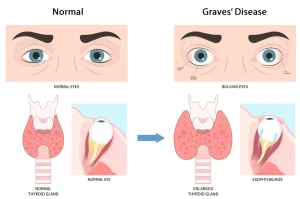Overview
Diagnosis
Graves’ disease is diagnosed through a combination of physical exams, medical history review, and specialized tests.
Blood tests
-
Measure levels of thyroid-stimulating hormone (TSH) and thyroid hormones (T3 and T4)
-
Detect antibodies that cause Graves’ disease to confirm autoimmune involvement
Radioactive iodine uptake
-
A small amount of radioactive iodine is taken orally
-
A scanning camera measures how much iodine the thyroid absorbs
-
Helps distinguish Graves’ disease from other causes of hyperthyroidism
-
May be combined with a radioactive iodine scan to visualize uptake patterns
Treatment
The goal of treatment for Graves’ disease is to reduce thyroid hormone production and manage the effects of excess hormones on the body.
Radioactive iodine therapy
-
Taken orally and absorbed by thyroid cells, gradually destroying them
-
Symptoms improve over several weeks to months
-
May worsen thyroid eye disease in some people
-
Often followed by daily thyroid hormone replacement
Anti-thyroid medicines
-
Block iodine use in thyroid hormone production
-
Common medications: methimazole and propylthiouracil
-
Methimazole is usually preferred, except during early pregnancy
-
Side effects include rash, joint pain, liver issues, and reduced white blood cell count
-
May be used long-term or in combination with other treatments
Beta blockers
-
Do not reduce hormone production but block hormone effects
-
Help control symptoms like irregular heartbeat, tremors, anxiety, sweating, and heat intolerance
-
Common beta blockers: propranolol, atenolol, metoprolol, nadolol
-
Use cautiously in asthma or diabetes
Surgery (thyroidectomy)
-
Removal of part or all of the thyroid
-
Lifelong thyroid hormone replacement required
-
Risks include damage to vocal cords and parathyroid glands
Treating thyroid eye disease
-
Mild cases: artificial tears and lubricating gels
-
Severe cases:
-
Corticosteroids to reduce swelling
-
Teprotumumab (IV therapy)
-
Prisms in glasses for double vision
-
Orbital decompression surgery if optic nerve is at risk
-
Orbital radiotherapy in select cases
-
Thyroid eye disease may persist or worsen temporarily after Graves’ treatment but often stabilizes within a year and gradually improves.
Advertisement

